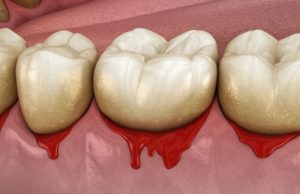A study published in the Journal of Clinical Periodontology suggests that patients with gum disease may have a higher chance of suffering severe complications related to COVID-19 than those without this infection. This is due to the link between inflamed gums and the body’s inflammatory response, which impacts the function of other body systems.
Therefore, your gum health is more crucial to prioritize than ever. Despite the stress of the ongoing pandemic, you should keep seeing your dentist for routine appointments to take care of your gums and the rest of your smile.
If you spot any issues with your gums, do not ignore the problem. You could be putting your overall well-being at risk if you let these concerns worsen. Read on to learn more about gum disease and its impact on your health.

Do I Have Gum Disease?
The early stage of gum disease, gingivitis, is often recognized by inflamed gum tissue. Patients may also have bleeding, soreness, and swelling in their gums with this infection.
As the disease progresses, the infection will reach the tooth root and jawbone. This can mean you notice a foul odor as well as looseness in the teeth and a recession of the gum tissue. Without treatment, gum disease could cause the teeth to fall out along with other irreversible dental damage.
But gum disease does not always manifest with these visible symptoms. This is why visiting your dentist for routine check-ups is so important. A dentist can spot issues in the gums that you may not have noticed.
Then the dentist can treat the problem before it causes major harm to your smile. It is easier to treat in its early stages and will not go away on its own. So make sure you keep seeing your dentist for these exams, including periodontal screenings.
How Will My Dentist Treat Gum Disease?
You will need intervention from your dentist to get rid of gum disease. When your dentist spots this issue, they can begin treatment right away. They will first clean excess bacteria and plaque from your smile, especially deep in the gum pockets.
This extensive cleaning process is called scaling and root planing. If the disease persists, you may require more targeted and intensive periodontal therapy to get rid of damaged gum tissue.
Your dentist may also suggest using an antibacterial mouthwash at home to balance the natural bacteria in your mouth. This will lower your risk of infections like gum disease. It will also relieve uncomfortable gum disease symptoms like swelling and bleeding.
You can prevent gum disease by practicing good oral hygiene. Cleaning your smile promptly and thoroughly will stop bacteria from lingering and infecting your gum tissue.
But some patients are more susceptible to gum disease and will require more comprehensive preventative dentistry. Ask your dentist for advice in preserving your gum health and fighting gum disease at your next appointment.
